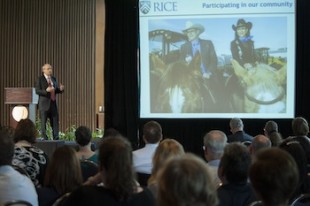Town hall gathering hears of progress, potential for next century
Rice University President David Leebron delivered a town hall talk April 2 that focused more on opportunities than operations.
The semiannual gathering in the Grand Hall at Rice Memorial Center began with an uplifting blast of energy from a Rice student band, Mariachi Luna Llena, and then looked forward to the challenges Leebron felt Rice was singularly poised to meet as the university moves further into its second century.
“I feel comfortable saying we are certainly in the most transformative period in higher education in the last 50 years,” Leebron said as he compared forces shaping higher education — finance, technology, effectiveness and outcomes, and globalization — to the biblical four horses of the apocalypse. He noted the pressures on “every single revenue source,” but also the opportunities offered by advanced technology and a global platform for Rice students and research.
“Our job is to figure out what the historic strengths of our university are, how to sustain them, nourish them and then build new things and take new approaches,” he said.
Those strengths include Rice’s status as “the smallest wide-spectrum research university in the country,” he said. “It’s important that we’re committed to making our education available regardless of people’s means, that everyone who can get into Rice – which is challenging – has the opportunity to come to Rice.”
Leebron noted Rice’s record number of applications this year, at more than 17,700 for 945 spots. “That’s a lot of picking and choosing,” he said. “We could fill the class with people with perfect SATs, but we choose not to. … We choose to fill it with the people we think can contribute the most to the quality of the education here.”
He said he appreciates Rice’s receptive response to the emergence of digital education, especially the faculty’s eagerness to take the challenge of distance learning head-on. When a call went out for proposals for online courses, he said, Rice faculty responded in greater numbers than those at the much larger University of Texas.

Rice President David Leebron told university staff that higher education is "in the most transformative period … in the last 50 years" at the spring town hall meeting. Photo by Jeff Fitlow
Growth is also evident in the university’s physical presence, particularly on the west end of campus, which he said will become the prime gateway to Rice for the community. With the new Anderson-Clarke Center home of the Glasscock School of Continuing Studies and James Turrell’s “Twilight Epiphany” Skyspace to be joined by a planned opera theater, the Robert A. Klein Hall for Social Sciences, the Moody Center for the Arts, a new football facility, a pavilion for soccer and track and the nearly completed George R. Brown Tennis Complex, Houstonians will have many more reasons to visit Rice – and the campus community will have more opportunities to show why Rice continues to be a gem for the city, he said.
That growth will place new demands on the university’s infrastructure, and Rice is actively seeking solutions to handle traffic, parking, utility tunnels and storm water remediation, Leebron said.
To questions about salaries and growth opportunities for staff, he said the university seeks to remain competitive in every way. He said universities are not structured “to provide the career ladders we need to.” However, he said Rice hopes to make more educational opportunities available to staff and well as opportunities to advance their careers within the university.
A question about the impact of the Affordable Care Act (ACA) on Rice gave Leebron a chance to explain that Rice eliminated some of the previous health care options because they did not comply with the ACA. However, he said, “We have a menu of plans in compliance with ACA that we think will serve our employees well.” He said the expanded options now include one with lower cost that he expects will be attractive to many employees.
He also addressed a question about Rice’s focus on undergraduate education versus research.
“If you go back to the beginning and the things Edgar Odell Lovett said at the founding ceremony, he envisioned the university from the very beginning as one of the great research universities, not of the country, but of the world,” Leebron said. Rice’s mission statement, he said, “talks about being a leading research university with a distinctive connection to undergraduate education.
“When I talk to our undergraduates, they’re here because of that commitment to being a research university. The campus feels a lot like relatively small liberal arts colleges but offers them access to the professors and laboratories that are at the forefront of discovery.”
At the start of the town hall, the 2014 Elizabeth Gillis Award for Exemplary Service was presented to Debra Purtee. (Read about that here.)
The Town Hall Committee of Jane Puthaaroon, B.J. Smith, Carlos Solis and Chair Marie Wehrung welcomes feedback on the event at http://staff.rice.edu/post_event_TownHall_survey.asp. You may also view the full town hall here.


Leave a Reply